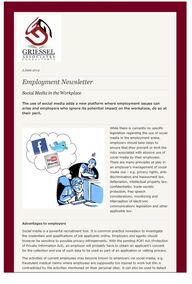
Return to flip book view
5 June 2014 Employment Newsletter Social Media in the Workplace The use of social media adds a new platform where employment issues can arise and employers who ignore its potential impact on the workplace do so at their peril While there is currently no specific legislation regarding the use of social media in the employment arena employers should take steps to ensure that they prevent or limit the risks associated with abusive use of social media by their employees There are many principles at play in an employer s management of social media use e g privacy rights antidiscrimination and harassment law defamation intellectual property law confidentiality trade secrets protection free speech considerations monitoring and interception of electronic communications legislation and other applicable law Advantages to employers Social media is a powerful recruitment tool It is common practice nowadays to investigate the credentials and qualifications of job applicants online Employers and agents should however be sensitive to possible privacy infringements With the pending POPI Act Protection of Private Information Act an employer will probably have to obtain an applicant s consent for the collection and use of such data to be used as part of an application or vetting process The activities of current employees may become known to employers via social media e g fraudulent medical claims where employees are supposedly too injured to work but this is contradicted by the activities mentioned on their personal sites It can also be used to detect
theft or misappropriation of trade secrets possible employee misconduct or breach of an employment contract Many people do not use the privacy settings on the social media pages which brings such information into the public domain Risks to employers Social media banter relating to race or gender may constitute harassment and create a hostile work environment Comments on a social media platform by the CEO in his private capacity may not always be distinguishable from his role in the company A manager s online gossip about an employee s supposed drinking problem may lead to a defamation claim Employees griping via social media about their work environment can impact on the employer s reputation as well as have a negative impact on productivity Unchecked use of social media by employees during working hours and or using company equipment or even off duty could lead to the employer incurring legal liability and it could also impact negatively on employees productivity How can the employer regulate manage the use of social media by employees How far should employers go to guide and monitor employees online networking and to prevent liability arising from the use of social media in the employment context The employer has the right to control the use of its own property such as computers cell phones and PDAs e g by way of spot checks or setting flags to indicate as to when social media websites are accessed Employees should be made aware of this and their consent to monitor their electronic communications as well as to use any evidence found in this manner should ideally be included in the employment contract An employee s on duty time belongs to the employer and it therefore can and should restrict or limit an employee s use of social media while at work even if the employee is using personal equipment especially if it impacts adversely on the work Technological means regularly updated can be used to prevent monitor employee access to social media platforms using company equipment Where employees use their own equipment the employer may investigate and take disciplinary action in the case of loss of productivity conduct issues etc The employer can take action against employees relating to their online activity even if this was done off duty or in their private capacity if such conduct can be linked to the business and impacts on the company s interests and or renders it legally liable For example if the employee disclosed confidential information of the employer if s he was identifiable as an employee of the employer when making inappropriate posts if a post involving a co worker has an adverse effect on the employment relationship if the employee has bad mouthed the company or its management etc A Social Media Policy can be used to communicate the do s and don ts to employees What should a social media policy include It should inform and guide employees in respect of acceptable and unacceptable online behaviour in line with the company s culture ethos and standing in the market place It must clearly prohibit employees from posting anything that amounts to unlawful harassment or discrimination illicit photos profanity or other derogatory content Outline the employer s rights to monitor the company s electronic systems and remind employees that no privacy can be expected when they use these systems
even deleted messages can usually be recovered State the company s level of tolerance for personal use of social media during working hours or when on breaks If the company permits or requires the use of social media for marketing and business development guiding principles should be provided to employees Outline how the company will monitor compliance with the policy and the consequences of any contraventions Employees need guidance in their use of social media every employer should have such a policy and should strictly monitor and enforce compliance or face exposure to legal financial or reputational risk Judith Griessel Like us on Facebook to keep up with our news updates and other discussions www griesselconsulting co za info griesselconsulting co za PO BOx 84245 Greenside Greenside Johannesburg 2034 South Africa If you don t want to receive emails from us anymore click here to unsubscribe If you re having trouble viewing this message open it in a browser window